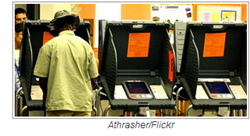As election law changes threatened access to the ballot box this year, African-American turnout operations strengthened.
In 2008, for the first time in our history, African Americans voted at the same rate as white voters.
We spent the next four years hearing that that high turnout was a fluke. "Experts" told us we would lose our enthusiasm. We’d be daunted by new voting laws. We’d want to protest marriage equality. We’d think our votes don’t count.
Those "experts" were wrong. African Americans turned out to vote in record numbers on Election Day, many of us waiting in long lines and going through plenty of red tape to do so. One of these determined voters was a 100-year-old "Church Mother" in  Elmhurst, New York who didn’t want any favors and stood in line and in solidarity with her fellow citizens.
Elmhurst, New York who didn’t want any favors and stood in line and in solidarity with her fellow citizens.
This happened not just because our enthusiasm lasted, but because our organization strengthened.
African-American communities had strong voter turnout operations long before there was an African-American man on the presidential ballot, with many of them centered around the Black Church.
These turnout operations are there for a reason: Ever since the process toward full citizenship of African Americans began with the 1863 Emancipation Proclamation and the 13th, 14th, and 15th Amendments, politicians and others have been trying to stop us from exercising the hard fought, hard won right to vote.
This year, the attacks on our voting system were intentionally suppressive. Elections officials in Ohio and Florida, for example, cut back on early voting hours, resulting in long lines at early voting locations and on Election Day — primarily in African American communities. Politicians from Pennsylvania to South Carolina tried to implement Voter ID laws, which disproportionately disenfranchise African Americans, other minorities, and the poor. Around the country, election law changes big and small threatened access to the ballot box.
In response to these attacks, African-American turnout operations developed and strengthened. I personally worked with 1,100 pastors in 22 states across denomination and faith traditions through our nonpartisan African American Ministers Leadership Council VESSELS program, to ensure that our congregations had both the skills and the will to vote.
We not only preached to our congregations about the importance of voting, we organized to make sure every person in our communities had the information and access they needed to vote. Reverend Tony Minor of Cleveland and Elder Lee Harris and Pastor R.L. Gundy of Jacksonville worked in diverse coalitions to organize early voting and an Election Day rides-to-the-polls hotline to help those in need get out to vote.
In Detroit, Bishops Allyson Abrams and Diana Williams recruited youth and young adults to share with people on the streets the importance of voting. Reverend Michael Couch of Philadelphia educated and motivated people who had served time for felonies and their families about getting their voting rights restored.
Reverend Barry Hargrove of Baltimore visited local barbershops on the weekends and registered voters while they got their hair cut. Reverend Charles Christian Adams in Detroit and Reverend Patrick Young in New York along with many others turned their fellowship halls into polling sites. Sister Jackie Dupont Walker in Los Angeles and Reverend Isaac McCullough in St. Louis used radio, email, and social media to spread the vote.
The civic engagement structure that African-American churches have built is here to stay. Next year, there will be municipal, state, and special elections, as well as ballot initiatives. It might be perceived as an "off year" for some, but for those of us who have been called to serve at such a time as this, it is "another year" to ask at every opportunity, "Are you registered, are you ready to vote?"
Pundits and politicians alike have tried to write off the African-American vote. But as every woman, man, youth, and elder of my community knows, we’ve come too far, seen too much, stood too long, felt "sick and tired of being sick and tired" too often, and fought too hard to turn back now.
Minister Leslie Watson Malachi is the director for African-American Religious Affairs at People For the American Way. www.pfaw.org. Distributed via OtherWords (OtherWords.org)
